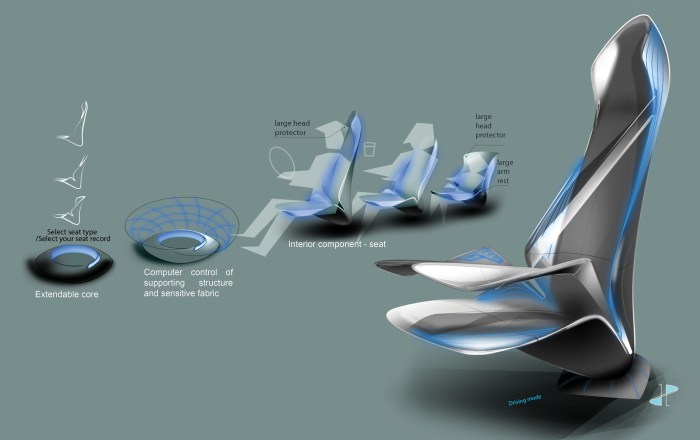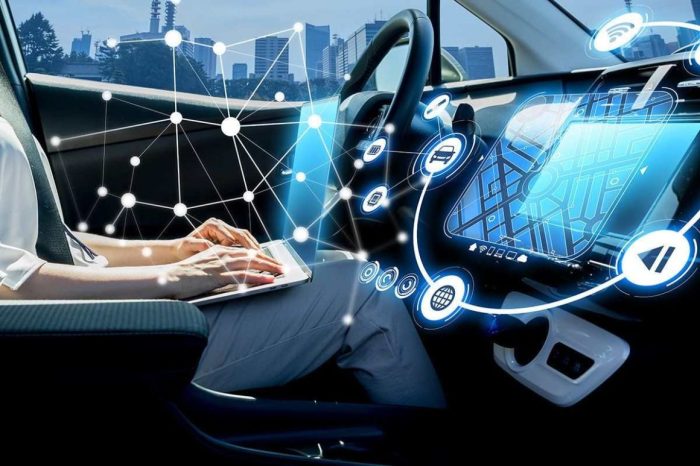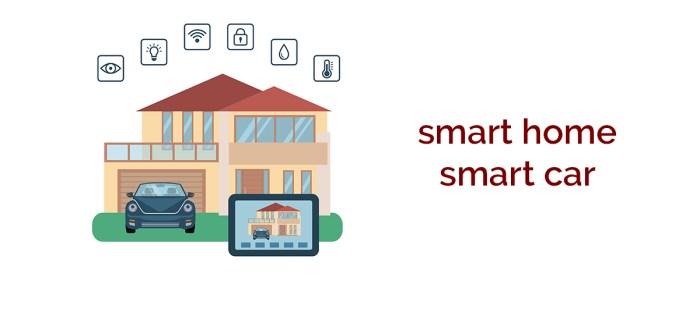The convergence of automotive technology and smart home systems is rapidly accelerating, promising a seamless and integrated lifestyle by 2025. This article delves into the exciting possibilities of smart car integration with home devices, exploring the current trends, technological advancements, and future implications for consumers. We’ll examine the key features, benefits, security considerations, and the potential challenges that lie ahead.

Source: behance.net
Key Features of Smart Car-Home Integration in 2025
By 2025, we can anticipate several sophisticated features resulting from the integration of smart cars and home devices. These features will enhance convenience, security, and energy efficiency.
Remote Vehicle Control and Monitoring
- Remote Start/Stop: Start your car remotely to pre-heat or cool the cabin before you even step outside, enhancing comfort and efficiency.
- Vehicle Status Monitoring: Receive real-time updates on fuel levels, tire pressure, and other vital vehicle parameters through your home smart display or mobile app.
- Remote Door Locking/Unlocking: Securely lock or unlock your car from your home automation system, adding an extra layer of convenience and security.
- GPS Tracking and Location Sharing: Monitor your car’s location and share its real-time position with family members for enhanced safety and peace of mind.
Home Automation Triggered by Vehicle Arrival/Departure
- Automated Lighting: Lights automatically turn on as you approach your home, illuminating your pathway and enhancing security.
- Climate Control Adjustment: Your home’s thermostat adjusts to your preferred temperature as your car approaches, ensuring a comfortable environment upon arrival.
- Garage Door Control: Your garage door automatically opens as you approach and closes securely after you park your vehicle.
- Security System Integration: Your home security system can be armed or disarmed based on your car’s arrival or departure, enhancing overall security.
Enhanced Security and Safety Features
- Integrated Security Alarms: Receive immediate alerts on your smart home devices if your car’s alarm is triggered.
- Emergency Services Notification: Automatic notification of emergency services in the event of a collision, providing crucial assistance in critical situations.
- Stolen Vehicle Tracking: Real-time tracking of your stolen vehicle through your home smart system, facilitating quicker recovery.
Technological Advancements Driving Integration
Several technological advancements are fueling the integration of smart cars and home devices:
- Improved Connectivity: 5G and other high-speed wireless networks provide the necessary bandwidth for seamless data transfer between vehicles and home systems.
- Advanced Cloud Platforms: Cloud-based platforms offer secure data storage and processing, enabling efficient communication between different devices and systems.
- Artificial Intelligence (AI): AI algorithms enable predictive maintenance, personalized comfort settings, and proactive safety features.
- Internet of Things (IoT): The proliferation of IoT devices creates a connected ecosystem, facilitating communication between smart cars, home devices, and other connected objects.
Benefits of Smart Car-Home Integration
The integration of smart cars and home devices offers numerous benefits:
- Enhanced Convenience: Streamlined control of various aspects of your life from a single interface.
- Improved Security: Increased protection for your home and vehicle through integrated security systems.
- Greater Energy Efficiency: Optimized energy consumption through smart climate control and lighting.
- Enhanced Safety: Proactive safety features and emergency response capabilities.
- Personalized Experience: Tailored comfort settings and automated routines based on individual preferences.
Security and Privacy Considerations
While the benefits are substantial, it’s crucial to address security and privacy concerns:
- Data Security: Robust encryption and secure data transmission protocols are essential to prevent unauthorized access to sensitive information.
- Privacy Protection: Clear data privacy policies and user controls are necessary to protect personal data and prevent misuse.
- System Vulnerabilities: Regular software updates and security patches are crucial to mitigate potential vulnerabilities and protect against cyberattacks.
Challenges and Future Outlook
Despite the potential, several challenges remain:
- Standardization: Lack of industry standards can hinder interoperability between different smart car and home systems.
- Cost: The initial investment in smart car and home automation technologies can be significant.
- Complexity: Setting up and managing an integrated system can be complex for some users.
- Reliability: Ensuring the reliable operation of interconnected systems is crucial for a seamless user experience.
However, the future outlook is positive. Continued technological advancements, increasing affordability, and greater standardization are expected to drive wider adoption of smart car-home integration in the coming years. We can anticipate even more sophisticated features and a more seamless user experience by 2025 and beyond.
Frequently Asked Questions (FAQ)
- Q: Will my existing car be compatible with smart home integration? A: Compatibility depends on your car’s features and the availability of integration solutions. Many newer models already offer connectivity features, while retrofitting solutions are emerging for older vehicles.
- Q: How secure is smart car-home integration? A: Security is a major concern. Reputable manufacturers employ robust security measures, including encryption and secure data transmission protocols. However, staying updated with software patches and choosing reputable brands is crucial.
- Q: What are the potential costs involved? A: Costs vary depending on the features and systems you choose. Expect costs associated with the smart car itself, home automation devices, and potential professional installation services.
- Q: Is smart car-home integration complicated to set up? A: The complexity varies depending on the system. Many systems offer user-friendly interfaces and apps, but some may require technical expertise for setup and configuration.
References
[Insert links to relevant articles and resources from reputable sources like automotive manufacturers’ websites, technology news sites, and industry research reports here. Examples could include articles from publications like Wired, TechCrunch, or reports from Gartner or Forrester.]
Call to Action
Embrace the future of connected living! Explore the possibilities of smart car-home integration and discover how you can enhance your convenience, security, and overall lifestyle. Research available options and consider upgrading your vehicle and home systems to enjoy the benefits of a seamlessly integrated smart home and smart car experience.
FAQ Explained
What security concerns exist with smart car-home integration?

Source: techjournal.org
Security is paramount. Potential vulnerabilities include unauthorized access to your home network through compromised car systems, requiring robust security protocols and encryption to mitigate risks.
How will data privacy be addressed in this interconnected system?
Data privacy regulations and transparent data handling practices will be crucial. Users should have control over the data shared between their car and home systems, with clear options for data access and deletion.
What about the cost of implementing smart car-home integration?
The cost will vary based on existing smart home infrastructure and the features desired. Expect a range of options, from simple integrations to more complex, high-end systems.

Source: windows.net
Will all car models and home devices be compatible?
Compatibility will be a key factor. Manufacturers are working towards standardization, but not all systems will initially be compatible, necessitating careful consideration of device choices.
